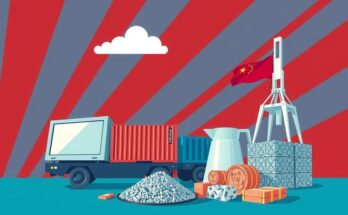In a landscape battered by tensions, President Trump’s declaration of tariffs against Canada, Mexico, and China stirred global ripples, igniting the familiar fears of trade wars. Economics expert Alexandre Padilla from MSU Denver highlights that these tariffs are essentially taxes on foreign goods, tarnishing competition and burdening American consumers with higher prices. Though Trump heralds these moves as victories, their true economic implications reveal a different narrative — consumers ultimately pay the price.
As Canada and Mexico deftly navigated Trump’s threats with prior agreements, the real substance of the concessions remains elusive. This episode reflects a political charade rather than a significant economic shift, misleading many voters. If Trump had taken a step back instead of wielding tariffs, it could have spared consumers the unnecessary financial strain exacerbated by the increasing costs of foreign imports.
Turning the spotlight on the housing sector, the threat of tariffs looms large. Homebuilders depend on materials like Canadian lumber and Chinese components, and any tariff imposition could escalate overall housing prices, further burdening struggling homebuyers. The irony is stark: Trump promises to reduce housing costs, yet his tariffs may likely inflate them instead.
In a broader sense, tariffs hinder American purchasing power, as rising prices reduce what consumers can buy. This is a paradox of modern economics: although tariffs may appear as political tools, they diminish individual wealth — a sentiment echoed through centuries of economic thought. If tariffs lead to a full-blown trade war, the consequences could be drastic, limiting consumer choices and inflating costs.
China, unlike Canada or Mexico, stands resolute against U.S. pressure. With retaliatory measures already in play, the potential for escalated conflict escalates. Historical data suggests that while the U.S. declared victory in previous trade skirmishes, the repercussions left consumers facing higher expenses without tangible benefits. Instead, China may leverage these situations to position itself as a stable economic partner.
The Wall Street Journal’s labeling of the tariffs as the “Dumbest Trade War in History” raises crucial questions. Political biases may skew public perception, as some voters ignore the economic fallout in favor of their beliefs. If grocery prices inflate ahead of the 2026 midterm elections, Republican candidates could indeed face serious backlash.
President Trump’s recent tariff announcements have reignited fears of trade wars, with Economics professor Alexandre Padilla asserting that tariffs are merely consumer taxes that inflate prices. While Canada and Mexico navigated the latest threats with prior arrangements, the impact on U.S. consumers could be detrimental. As tensions rise, particularly with China, experts warn that tariffs lead to no genuine winners, leaving consumers to face the fallout.
In summary, tariffs are politically motivated tools that may provide temporary relief to certain domestic producers but ultimately lead to increased costs for consumers. The complex interplay of trade dynamics may paint an optimistic picture for political gains, yet historical precedents reveal that trade wars deliver little in benefits, leaving a trail of consumers trapped in rising prices. As tensions with powerful trading partners like China unfold, the stakes grow higher, potentially leading to dire economic consequences for the average American. Economic scholars uniformly warn against the pitfalls of tariffs, affirming that history indicates no winner emerges from such conflicts but consumers left to bear the burden.
Original Source: red.msudenver.edu



